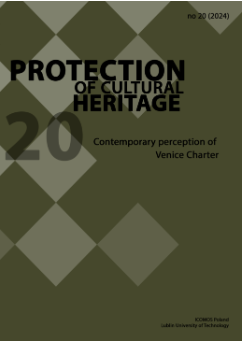UWARUNKOWANIA I ZAŁOŻENIA SYSTEMU SŁUŻB OCHRONY ZABYTKÓW W POLSCE
Bogusław Szmygin
Wydział Budownictwa i Architektury, Politechnika Lubelska (Polska)
https://orcid.org/0000-0003-0629-4495
Abstrakt
Since 1989, the system of monument protection in Poland has been adapting to the changes occurring in the Polish political system. Defining the scope of power and duties of historic preservation services is not only a tremendously important element of these changes. It is also a key factor in how the monument protection system functions.
The nature of the changes results in stakeholders playing increasingly significant role in protection of monuments and sites – they become major partners to historic preservation services. Moreover, these services may find regional government bodies having broad scope of duties pertaining to monument protection particularly useful.
Increasing significance of the role that local government bodies have been playing results in the scope of power and duties of regional historic preservation offices being broadened. Local government bodies are therefore going to participate more actively in the protection of historic monuments and sites. At the same time, their actions should be inspired, planned, and coordinated by regional historic preservation services. Support and supervision, on the other hand, should be provided by state historic preservation service being independent of local government bodies. The state and local government services cannot be therefore considered an alternative – they should fully and closely cooperate with each other. For this reason, cooperation among these services should be promoted and encouraged.
Słowa kluczowe:
state and regional historic preservation servicesBibliografia
Bohm A., Dobosz P., Jaskanis P., Purchla J., Szmygin B., Raport na temat funkcjonowania systemu ochrony dziedzictwa kulturowego w Polsce po roku 1989, J. Purchla (red.), Narodowe Centrum Kultury, Warszawa 2009.
Google Scholar
Dąbrowski J., Jankowski D., Czy Wawel można odbudować? [w:] Klasyfikacja i kategoryzacja zabytków, PKN ICOMOS, Warszawa 2016.
Google Scholar
Deklaracja z Hangzhou, przyjęta przez kongres UNESCO (15-17 maja 2013 roku) - Kultura: klucz do zrównoważonego rozwoju (Culture: Key to Sustainable Development).
Google Scholar
Dlaczego i jak w nowoczesny sposób chronić dziedzictwo kulturowe, A. Rottermund (red.), PK ds. UNESCO, Warszawa 2014.
Google Scholar
Guidelines on Education and Training in the Conservation of Monuments, Ensembles and Sites, 10th General Assembly ICOMOS, Colombo (Sri Lanka), 1993.
Google Scholar
I Kongres Konserwatorów Zabytków, Warszawa 2005.
Google Scholar
II Kongres Konserwatorów Zabytków, Warszawa- Kraków, 2015.
Google Scholar
Julian Smith, Marrying the old with the new in historic urban landscapes, [w:] Managing Historic Cities, World Heritage Centre, Paryż 2010.
Google Scholar
Konferencja – System ochrony zabytków w Polsce – diagnoza, analiza, propozycje, Warszawa 2011.
Google Scholar
Kongres Kultury Polskiej, Kraków 2009.
Google Scholar
Konkluzje Rady Europy z dnia 21 maja 2014 roku dotyczące dziedzictwa kulturowego jako strategicznego zasobu dla zrównoważonej Europy.
Google Scholar
Krajowy program ochrony zabytków i opieki nad zabytkami na lata 2014–2017, Warszawa 2014.
Google Scholar
Principles for Capacity Building through Education and Training in Safeguarding and Integrated Conservation of the Cultural Heritage, ICOMOS International Training Committee, 2013.
Google Scholar
Protecting and safeguarding cultural heritage. Systems of Management of Cultural Heritage in the Visegrad Countries, J. Purchla (red.), International Cultural Centre, Kraków, 2011.
Google Scholar
Recommendation on the Historic Urban Landscape, UNESCO General Conference, 36th Session, Paryż 2011.
Google Scholar
Rola samorządowych służb konserwatorskich w systemie ochrony zabytków w Polsce, UM Lublin, Narodowy Instytut Dziedzictwa, Lublin-Warszawa, 2011.
Google Scholar
Rozporządzenie Ministra Kultury i Dziedzictwa Narodowego z dnia 14 października 2015 r. w sprawie prowadzenia prac konserwatorskich, prac restauratorskich, robót budowlanych, badań konserwatorskich, badań architektonicznych i innych działań przy zabytku wpisanym do rejestru zabytków oraz badań archeologicznych i poszukiwań zabytków.
Google Scholar
System ochrony zabytków w Polsce – diagnoza, analiza, propozycje, B. Szmygin (red.), PKN ICOMOS, Stołeczny Konserwator Zabytków, Warszawa-Lublin 2011.
Google Scholar
The Framework Convention on the Value of Cultural Heritage for Society (The Faro Convention), Council of Europe, Faro, 27th October 2005.
Google Scholar
The Namur Declaration, przyjęta przez zgromadzenie ministrów przy Radzie Europy, 23-24 kwietnia 2015.
Google Scholar
Ustawie o ochronie zabytków i opiece nad zabytkami z 2003 roku.
Google Scholar
Autorzy
Bogusław SzmyginWydział Budownictwa i Architektury, Politechnika Lubelska Polska
https://orcid.org/0000-0003-0629-4495
dr hab. inż., profesor Politechniki Lubelskiej; kierownik Katedry Konserwacji Zabytków; dziekan Wydziału
Budownictwa i Architektury PL (2005–12; 2016+); prorektor Politechniki Lubelskiej (2012–2016).
Specjalizuje się w zagadnieniach ochrony i konserwacji zabytków architektury (m.in. teoria konserwatorska,
Światowe Dziedzictwo UNESCO, rewitalizacja miast historycznych, ochrona ruin). Autor ponad 100 publikacji
(m.in. monografii „Kształtowanie koncepcji zabytku i doktryny konserwatorskiej w Polsce w XX wieku”,
„Vademecum Konserwatora Zabytków”, „Zasady projektowania i umieszczania nośników informacji wizualnej i reklam na obiektach i w obszarach zabytkowych”, „Światowe Dziedzictwo Kultury UNESCO – charakterystyka, metodologia, zarządzanie”), redaktor naukowy ponad dwudziestu monografii, autor kilkunastu programów badawczych i edukacyjnych (m.in. kilkudziesięciu scenariuszy filmów edukacyjnych).
Prezes Polskiego Komitetu Narodowego ICOMOS, sekretarz generalny Międzynarodowego
Komitetu Teorii Konserwatorskiej, przewodniczący Komitetu ds. Światowego Dziedzictwa UNESCO
w Polsce (2011–14).
Statystyki
Abstract views: 227PDF downloads: 188








